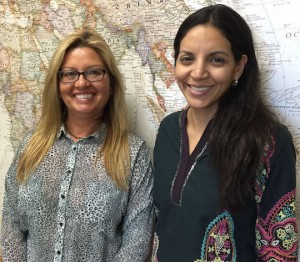With contract extension, LSI will continue work in Ethiopia on training teachers in reading instruction

Flavia Ramos-Mattoussi, Ed.D., at left, is principal
investigator on the project and senior research associate
with LSI’s Center for International Studies in Educational
Research & Development. Carla Paredes-Drouet, at right,
is an early childhood education and development specialist
with more than eight years of international experience who
is assisting on the project. Paredes-Drouet, a native of
Quito, Ecuador, is also a Ph.D. student in FSU’s College
of Education.
A team of experts from FSU’s Learning Systems Institute has received extended funding to continue work with officials and educators in Ethiopia to reform reading instruction in the African nation.
“This is a challenging project, because Ethiopia has one of the most inclusive policies on language of instruction, with more than 20 mother tongue languages being used in classrooms,” said Dr. Flavia Ramos-Mattoussi, the principal investigator and a senior research associate with the Center for International Studies in Educational Research & Development, part of the Learning Systems Institute.
The FSU team in Ethiopia, including Drs. Marion Fesmire and Adrienne Barnes, is working alongside local educators to develop up to seven modules (textbooks) in seven national languages and English.
FSU is a partner to RTI International on the project, “Reading for Ethiopia Achievement Developed Technical Assistance,” which is funded by the U.S. Agency for International Development. With the new contract extension, the funding for FSU’s portion of the project now exceeds $2.2 million.
“This project is designed to ensure that reading and writing skills are sufficiently developed in the primary school in the seven most widely spoken languages.” said Ramos-Mattoussi. “Our FSU team focuses on development of teacher education, curriculum and materials and on training of teacher educators.”
The project’s goals are ambitious — it expects to reach 15 million children in all schools and all regions of Ethiopia.
Read more about this project here.
